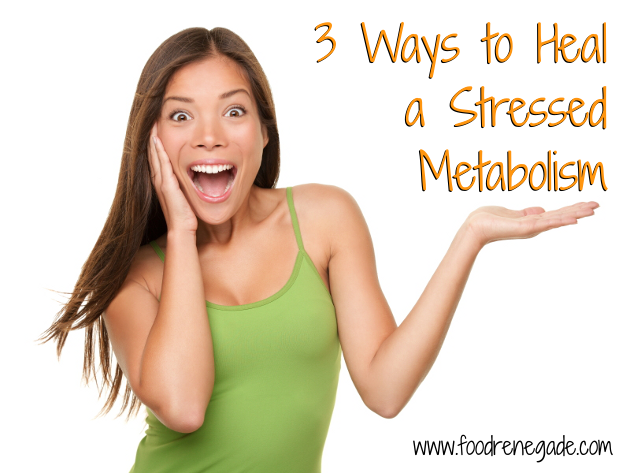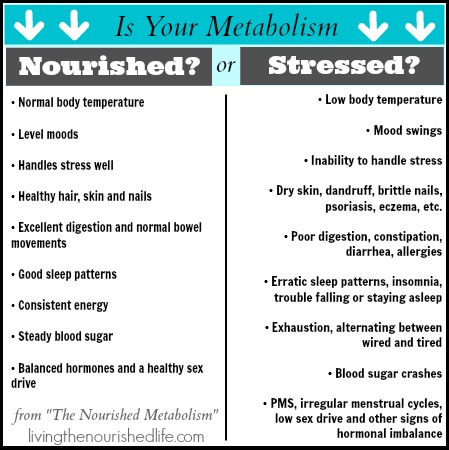Do you have a stressed metabolism? Have you ever lost weight by going on a restrictive diet, then gained it all back (even if you didn’t entirely abandon the diet)?
Or maybe you’ve got thyroid problems, irregular menstrual cycles, mood swings, or acne? Are you tired during the day and alert at night?
If any of these sound familiar, it’s likely you have a stressed metabolism. Thankfully, it doesn’t have to stay that way. You can heal your metabolism and restore your health!
What is metabolism?
Put simply, your body’s metabolism is the rate at which your cells produce energy. It’s responsible for regulating all the cellular functions of your body.
So naturally, when your metabolism is stressed, it has the potential to throw a lot of systems completely out of whack.
Why Diets Don’t Work
Diets fail because they stress your metabolism rather than boosting it.
In her e-book The Nourished Metabolism, Elizabeth Walling argues that by starving your body of nutrients and energy (calories), diets set off the body’s long-term starvation response (triggering fat storage). She elaborates:
It’s an incredibly effective model. When you start dieting, the appetite goes up and so does fat storage, while energy levels go down so you’re not in the mood to hop on the treadmill. Every single biochemical reaction in your body is then rigged to save every ounce of fat it can…
This is why diets ultimately fail. Every diet that forces your body to do the opposite of what it’s striving for will result in an even more exaggerated response. This is why it’s not uncommon to regain weight lost during a diet, plus a little extra. The body pads on a little more because it’s biochemically convinced this is what’s necessary for survival.
Make sense?
So how exactly are you stop stressing your metabolism and heal it?
#1 — Heal A Stressed Metabolism with Food
Don’t cut calories. Don’t eat a restrictive diet. (And yes, diets that radically reduce the intake of any particular macronutrient like carbs, protein, or fat count as restrictive diets!)
Walling writes:
If you want to stress out your metabolism, start denying it some of the most basic elements it needs to survive. This simple act of deprivation is enough to trigger the release of stress hormones (and all the accompanying side effects). Why? Because the body uses the stress hormones adrenaline and cortisol to access alternate sources of energy (i.e. get sugar from protein or ketones from fat).
In the beginning, these deprivation diets can produce weight loss and even some positive side effects that make it appear as if they’re helping. But that’s just the initial surge of adrenaline and cortisol talking.
Did you catch that?
Most restrictive diets appear to be successful at first because your body’s stress response kicks in. But what happens months (or even years) later when your body’s metabolism has been operating at high-stress levels continuously that whole time?
You gain the weight back.
So what foods will heal a stressed metabolism?
The first priority is to eat Real Food — food that’s unprocessed, organic when possible, and traditionally-prepared.
The second priority is to eat a balanced diet. Your body needs carbs, fats, and protein to promote a nourished metabolism. It needs both nutrient-dense foods (usually these are higher in fat & protein) and energy-dense foods (usually these are higher in carbs). Walling continues:
Your body needs a careful balance of energy versus nutrients. Too much energy without enough nutrients, and you wind up with problems connected to nutrient deficiencies. Plenty of nutrients without enough energy leads to a slow metabolism and its associated side effects.
Interesting, isn’t it?
Put in practical terms, this kind of balanced diet means that it’s okay to have energy-rich foods (like apples) that may be lacking in nutrient-density but rich in energy. It’s okay to have a side of rice with your grass-fed beef stew that’s been cooked in real bone broth.
#2 — Heal A Stressed Metabolism by Reducing Stress
By stress, I’m not just referring to emotional stress. Walling clarifies:
Physiologically, stress could be considered any event that triggers a marked response by the adrenal glands. In basic terms, this response is the release of the stress hormones like adrenaline and cortisol. It’s the body’s natural reaction to any stressor.
So yes, emotional stress applies. But so do a host of other things, like:
- Lack of sleep
- Lack of sunshine
- Allergies
- A restrictive diet
- Too much exercise
- Exposure to toxins
And that’s just scratching the surface!
So, if you want to heal your metabolism, you need to take active steps to examine the stressors in your life and reduce or eliminate them.
Get more sleep. Go outside in the sun. Reduce exposure to toxic chemicals and improve your body’s detox pathways. Eat a balanced diet. You name it.
Prioritize reducing the chronic stressors.
#3 — Heal A Stressed Metabolism by Balancing Rest and Activity
We’ve always been told that the key to weight loss is to cut calories and exercise more. If you have a stressed metabolism, following that advice will only exacerbate your issues.
Instead, we need to place a priority on improving our sleep. (Read: 7 Tips to Get a Good Night’s Sleep)
Walling tells us why:
Lack of sleep is a direct stress on the body. Sleep studies show that even one night of poor sleep can elevate your cortisol levels the next day. Imagine what happens when you sleep poorly almost every night! It’s a recipe for chronically high stress hormones.
But as important as quality rest is, we need to balance that with good activity levels.
Unfortunately, activity levels aren’t a one-size-fits-all sort of deal. The appropriate activity level for you depends entirely on how stressed your metabolism already is. That’s because too much physical activity can also elicit a stress response in your body.
So, if you’ve been a chronic over-exerciser, you may need to tone down your activity levels to give your over-stressed metabolism a chance to heal and recharge. If you’ve been mostly sedentary, you’ll want to incorporate daily movement of some kind into your life. Exactly how much exercise is appropriate for you will depend on a number of factors — your rest levels (make sure you’re getting enough), the amount of energy in the food you consume (more calories support more exercise), and the type of activity (slow & steady vs. fast & stressful).
P.S. Want to snag The Nourished Metabolism for free?
The book is available over on Amazon, and the Kindle edition is free with Kindle Unlimited, or $8.99 if you’re not a subscriber.
(Click here to buy the book)
 |


















Great post! I did not see the winner for the vitamix. Did I miss it?
No, you didn’t. Winners get posted on the 3rd of each month, so stay tuned!
Excellent summary, Kristen. Would you mind if I print and share this post with my patients? If you wouldn’t mind,e-mail and let me know!
Oh my gosh, it’s Ariane the overexposed stock image model!
Hey kristen, A year & half ago I started dieting & cutting calories like crazy (800 or so) & almost no carbs at all. Of course I lost alot of weight 25 kg or so I reached 52 kg & I’m 169 cm. however, my hair thinned I always felt cold my period stopped.I also was exercising everyday ,cardio most of the time. Then I developed binging on dry fruits m. I fed up and started to up my calories around 1200 or something which is still low .. Then now I decided to eat whole plant based food ,aka,vegan so of course my carb intake increased but still under 2000 & I’m getting fatter luckily because I do strength training 3 times aweek now so I still in a good shape but no I’ve gained much I didn’t want to weigh myself but some of my clothes don’t fit anymore:( I read it might be adaptive thermogenesis & eventually my weight will plateau & then lose fat … What do you think of this ?? I’m really frustrated & doctors in my town don’t give me any help just cyclopregnova and shits to bring my period !! What can I do??